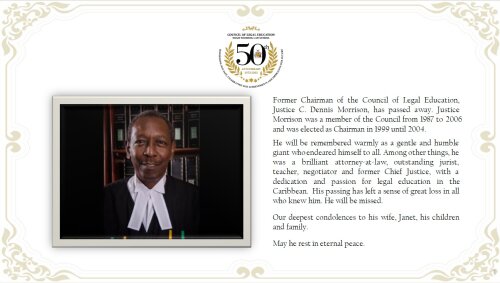Best Reinsurance Lawyers in Trinidad and Tobago
Share your needs with us, get contacted by law firms.
Free. Takes 2 min.
Or refine your search by selecting a city:
List of the best lawyers in Trinidad and Tobago
About Reinsurance Law in Trinidad and Tobago
Reinsurance is a process whereby insurance companies transfer portions of their risk portfolios to other parties, known as reinsurers, to reduce the likelihood of paying a large obligation resulting from an insurance claim. In Trinidad and Tobago, reinsurance plays a critical role in enhancing the stability and capacity of the insurance market by allowing insurers to manage risk more effectively. The regulatory framework governing reinsurance in Trinidad and Tobago ensures that these processes are robust, secure, and compliant with international standards. This framework is enforced by the Central Bank of Trinidad and Tobago, which supervises and monitors insurance and reinsurance bodies to maintain market integrity and consumer protection.
Why You May Need a Lawyer
Several scenarios might necessitate seeking legal advice concerning reinsurance in Trinidad and Tobago. Common situations include:
- Negotiating reinsurance contracts to ensure fair terms and compliance with local laws.
- Resolving disputes arising from reinsurance agreements or claims handling.
- Navigating regulatory requirements and compliance with local and international laws.
- Advising on risk management and capital adequacy concerning reinsurance treaties.
- Handling cases involving the insolvency of insurers or reinsurers.
Local Laws Overview
Reinsurance in Trinidad and Tobago is primarily governed by the Insurance Act, which sets out the legal framework for all insurance-related activities. Key aspects relevant to reinsurance include:
- Licensing and Regulation: Reinsurers must be licensed and are subject to strict regulatory oversight to protect policyholders and prevent financial instability.
- Capital and Solvency Requirements: These requirements ensure that insurers and reinsurers have sufficient financial resources to cover their obligations.
- Consumer Protection Standards: Laws are in place to ensure claims are handled fairly and transparently.
- Dispute Resolution Mechanisms: Legal pathways exist to address disagreements between insurance companies and reinsurers efficiently.
Frequently Asked Questions
What is the purpose of reinsurance?
Reinsurance aims to mitigate the risk faced by insurance companies by allowing them to share potential losses with other companies, thus stabilizing their financial standing.
Is reinsurance mandatory for insurers in Trinidad and Tobago?
While not explicitly mandatory, reinsurance is a common practice to ensure financial stability and adherence to solvency requirements prescribed by regulatory authorities.
How is the reinsurance market regulated in Trinidad and Tobago?
The Central Bank of Trinidad and Tobago oversees the reinsurance market, ensuring compliance with local laws and international standards to protect policyholders and maintain market integrity.
Can reinsurance agreements be customized?
Yes, reinsurance contracts can be tailored to meet the specific needs of the insurer and reinsurer, ensuring alignment with strategic objectives and risk profiles.
What happens if a reinsurer defaults?
If a reinsurer defaults, it can have serious financial repercussions for the primary insurer, underscoring the importance of due diligence and selection of financially stable reinsurance partners.
Are there tax implications for reinsurance transactions?
Yes, reinsurance transactions can have tax implications, and it's advisable to consult with a legal professional to understand the specific tax treatment of these agreements under local tax laws.
How are reinsurance disputes resolved?
Disputes may be resolved through arbitration, mediation, or litigation, with the specific process often outlined in the reinsurance agreement.
What are common types of reinsurance contracts?
Common types include proportional reinsurance (sharing premiums and losses) and non-proportional reinsurance (providing coverage for losses that exceed a particular threshold).
How can I assess a reinsurer’s financial stability?
Review credit ratings provided by independent rating agencies, analyze financial statements, and assess track records with regard to claims payments to gauge financial stability.
Is cross-border reinsurance allowed?
Yes, cross-border reinsurance is permitted; however, it must align with local legal requirements and international agreements.
Additional Resources
For further assistance, you may contact or explore the following resources:
- Central Bank of Trinidad and Tobago: Provides guidance on regulations and compliance.
- Trinidad and Tobago Insurance Institute (TTII): Offers educational resources and seminars.
- Local Law Firms: Specializing in insurance and reinsurance law for personalized legal advice.
Next Steps
If you require legal assistance in the field of reinsurance:
- Start by consulting a local attorney specializing in insurance or reinsurance law to discuss your specific needs and circumstances.
- Conduct a comprehensive review of your reinsurance agreements and related documents with professional assistance.
- Engage with industry bodies or regulatory authorities for updated guidelines and legal support.
Taking these steps can help mitigate legal risks and ensure that your activities align with local laws and regulatory expectations.
Lawzana helps you find the best lawyers and law firms in Trinidad and Tobago through a curated and pre-screened list of qualified legal professionals. Our platform offers rankings and detailed profiles of attorneys and law firms, allowing you to compare based on practice areas, including Reinsurance, experience, and client feedback.
Each profile includes a description of the firm's areas of practice, client reviews, team members and partners, year of establishment, spoken languages, office locations, contact information, social media presence, and any published articles or resources. Most firms on our platform speak English and are experienced in both local and international legal matters.
Get a quote from top-rated law firms in Trinidad and Tobago — quickly, securely, and without unnecessary hassle.
Disclaimer:
The information provided on this page is for general informational purposes only and does not constitute legal advice. While we strive to ensure the accuracy and relevance of the content, legal information may change over time, and interpretations of the law can vary. You should always consult with a qualified legal professional for advice specific to your situation.
We disclaim all liability for actions taken or not taken based on the content of this page. If you believe any information is incorrect or outdated, please contact us, and we will review and update it where appropriate.
Browse reinsurance law firms by city in Trinidad and Tobago
Refine your search by selecting a city.










